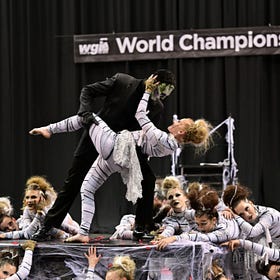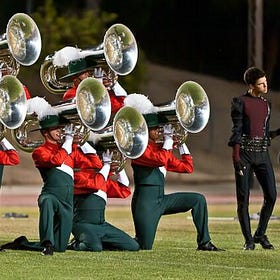WGI Rules Changes
Viva Las Vegas!
This weekend in Las Vegas, indoor guard, winds, and percussion instructors and designers met to discuss a wide variety of rule change proposals to benefit the activity. Here is an analysis of what was proposed and the resulting votes:
Color Guard
Proposal #1: Require IO and IW groups to achieve a minimum score at Regionals in order to be allowed to perform at World Championship Prelims
Result: FAILS 7-38 (with 3 Abstentions)
The proposal was created to “assure that a minimum level of quality and achievement exists” for the IO/IW classes. Two groups in attendance at this year’s World Championships would not have qualified for World Championships if this rule had already been in place, and this proposal seems aimed at those types of groups. The rationale is that WGI regularly has to waitlist groups for Championships and that it is unfair to groups whose skills are on par with their class to get waitlisted while a group below their class's skillset does get to perform.
Opponents of this proposal argue that since IW is the only class without an age-out (and Open Class has a higher age-out than A class), it means that there will be groups that fall below the World Class skill level for them to be inclusive. Some people come to the color guard activity later in life or whose skills did not develop to an Open or World class level before they age out. These groups provide a home for older performers with a lower skillset.
Proposal #2: Re-evaluate the weighting of Vocabulary vs Excellence in the A Classes
Result: Amended and Passed 47-2
Currently, the subcaptions of Equipment and Movement (Vocabulary and Excellence) in the A classes are weighted towards Excellence, with that subcaption accounting for 65% vs. Vocabulary, which accounts for 35%. The point of this weighting is to reward the achievement of skills vs. trying harder and more complex skills.
This proposal was amended so that the A class weighting remains the same 65%/35% split, while the Regional class is weighted more heavily in favor of Excellence with a 70%/30% split. Given that the Regional A class is WGI’s “beginner” class, it makes sense that it would focus the most on achievement.
Proposal #3: Change the Classification Review Process to start with WGI officials, then the Reclassification Committee (made up of instructors)
Result: Passes 45-2 (1 Abstention)
The current process is for the instructor committee, along with the Color Guard Education Director, The Director of Color Guard, and the Color Guard Chief Judge, to vote on all groups up for reclassification. This proposal breaks that process up into two rounds. Now, a group must be voted for reclassification by the three WGI officials first, and THEN the instructors vote on whether to reclassify or not. A group would need 6 out of 8 votes to get reclassified, representing roughly 75% agreement between both review groups.
2023 WGI World Championships by the Numbers
A little over a week ago, the 2023 Winter Guard International season concluded after two weeks of World Championships events. The seven total days of competition in Dayton, Ohio put a bow on the season that included 32 color guard regional events, 21 percussion & winds regional events, and 3 additional winds only events to make this year the biggest sea…
Proposal #4: Remove the CEO of WGI from ruling on reclassification appeals
Result: Passes 38-5 (5 Abstentions)
WGI’s governance structure has two sides: the business side and the competitive side. The current language appointing the CEO of WGI to rule on classification appeals is from a time when WGI was just color guard. Now that WGI has three divisions and their structure is set up so that the business and competitive aspects are separate, it no longer makes sense for the head of the business side to rule on matters of the competitive side. This proposal will have the Director of Color Guard, Chief Judge, and an Adjudication Caption Manager decide appeals. If the Director of Color Guard breaks a tie in the original decision, a second Adjudication Caption Manager will replace the Director of Color Guard.
Proposal # 5: Allow units only attending one Regional to send in a video for reclassification
Result: Passes 38-9 (1 Abstention)
Some groups have to travel a long way for a Regional, and sometimes the only regional close is very late in the season. Since reviews for classification only happen to groups attending regionals, this has led to some groups getting reclassified VERY late in the season. This proposal seeks to limit that by allowing groups to send in a video of their group BEFORE they perform at the regional to be evaluated for classification. This means that a group can be potentially reclassified into the suitable class before their single Regional, allowing them to compete and get feedback on the proper sheets before attending World Championships. The hope is that this will limit groups getting reclassified at the last Regional and having their first performance on the new sheets be at WGI Championship Prelims.
Proposal #6: Increase the amounts of guards automatically flagged for reclassification
Result: Fails 21-23 (4 Abstentions)
Currently, the top 2 placing guards in A and Open Class at a Regional are automatically reviewed for classification. This proposal sought to ADD any unit within .5 of the automatic review score. On the sheets, a .5 difference in score is labeled a “moderate difference’, so the thought process is that by reviewing groups that are only “moderately different” than those currently reviewed, fewer guards will get overlooked for review.
Proposal #7 Allow organizations with multiple guards to remain in a class they were promoted from as long as 95% of the membership was different
Result: Fails 14-30 (4 Abstentions)
Currently, WGI automatically promotes the top 3 A and Open Class Guard groups at Finals every year. The reasoning behind this is that if you achieve the top of your class, you are ready for the next class. An issue has come up where organizations with multiple guards in different classes have one group that gets promoted to the next class. This means organizations are forced to either start ANOTHER guard to cover that class or have a gap in their offerings.
Proponents of this proposal argue that organizations should be allowed to have a consistent offering from year to year and be exempt from the automatic promotion as long as the membership is different.
Let’s use the Origins organization as an example; they have Open and World Class guards and have just announced an A-class guard. Their Open guard finished 4th this year, but if they had been third, they would have been promoted to World. This means that instead of having one guard per division in their organization, allowing them to take students from any skillset, they would be forced to have an A-class guard and two World-class guards.
A Look into the Past: "The Devil's Staircase"
Imagine you’re in Hell, and you want out. These eight words from Brandt Crocker on DCI Finals night in 2011 took the place of the expected announcement of the corps’ name, and that name was the Santa Clara Vanguard. Following those eight words was a brief silence, then one of Vanguard’s iconic “horn clicks” (bringing up the horns all at once so fast that…
Proposal #8 Add (non-voting) adjudication representation to the Steering Committee
Result: Passes 35-10 (3 Abstentions)
Currently, the Steering Committee is made up of 5 elected instructors. Adding adjudication members to the committee will give it a fuller context of the activity when making decisions.
Proposal #9: Increase the maximum performer limit from 40 to 50
Result: Passes 30-17 (1 Abstention)
Wgi first implemented its 40-performer limit as a safety measure, as many people thought that many people on a floor spinning at once would lead to more injuries. With more groups choosing to utilize larger floors, it appears that the voting members agreed that 50 performers could perform safely.
Proposal #10: Allow all classes to utilize power outlets
Result: Passes 38-10
Currently, only World Class groups are allowed to utilize the power outlets provided at the front and back of the floor. The thought process behind limiting it to World Class groups was to keep the focus on the lower classes on spinning and moving rather than adding lights/sound systems/giant TVs, etc. As those elements have become much more common (not to mention affordable) in DCI and Marching Band, it makes sense to allow guards of all classes to utilize those elements.
Probabilistic: The Odds of Making Finals at WGI World Championships
In only a few days from today, 319 color guards from 38 states and three countries (Canada, The Netherlands, and the United Kingdom will all be represented!) will descend upon Dayton, Ohio to compete at the 2023 Winter Guard International World Championships. WGI is looking forward to their biggest guard championships since 352 guards attended in 2019, …
Percussion
Proposal #1: Have Open Class Prelims/Semis/Finals all in the same venue
Result: Withdrawn
Currently, Open Class groups perform in different venues for each round. That brings challenges to the performers and instructors in adapting to a different environment without the opportunity to adjust. Unfortunately, because of the large number of units and limited amounts of performance venues, there have been no feasible alternatives proposed to how it is currently done.
Proposal #2: Make the Number of Finalists the Same for All Three Concert Classes
Result: Withdrawn
Currently, 75% of Open and World Class concert groups make finals, while only 50% of A Class Concert groups advance to finals. This proposal would have made the cutoff 75% for all classes.
Proposal #3: Create a Committee to Update the Artistry Sheets for Concert Class
Result: Passes 50-0 (1 Abstention)
The percussion division has the only class in WGI that is standstill. As a result, it has its own two sheets: Music and Artistry. Artistry is more of a “General Effect” caption, while the Music caption handles more of the technical aspect. On the marching side of WGI percussion, the GE sheet has undergone MANY tweaks and changes, while the Artistry sheet has remained relatively the same. This proposal will allow for a committee to update the sheets, taking into account the differences in GE on the marching side, and better reflect the changes that have occurred in the concert class since the last time the sheet was updated.
AS TIME GOES BY...
It has been just over a year since GEM was launched, and in order to celebrate that, a few of our writers picked their favorite article that GEM has published over the course of the past year, and have provided some insight on why they loved it. Enjoy!
Proposal #4: Eliminate Restrictions on Vocal Sampling
Result: Passes 50-0 (1 Abstention)
This is hugely significant, and many thought it faced heavy opposition, especially since the Percussion side adopted a proposal requiring a two-thirds majority to pass ANY proposal. The rule limiting all samples to be sampled “in real time” has been the most contentious topic of discussion at the Percussion Advisory Board meetings for over a decade. There have been many different proposals trying to get rid of this rule, but they always met the same fate: lots of passionate debate, a few binders thrown, but ultimately never enough votes to get rid of it.
It’s important to note that this proposal only applies to VOCAL samples. Any other sample with rhythmic intent must still be triggered individually.
Those in favor of limits argued that WGI Percussion is a live activity and that allowing any prerecorded samples calls all that into question. Arguments were made about rewarding the performer's skill in triggering the samples in real time.
Opponents of the measure argued that cutting up samples word by word was cumbersome and that the skill of triggering them did not apply to any other musical genre. There were also debates about who was really getting rewarded for the cut-up samples. Adult designers cut up most samples, so many arguments were made that the adults were the ones getting the credit anyway.
An interesting line from the proposal, “Craft and training in this area no longer serve as distinguishing factors.” highlights that one of the reasons this rule was held on to for so long was that some believed that they, as adults, had a competitive advantage with the rule in place.
Another notable thing about this proposal is WHO proposed it. Typically, proposals are submitted by an individual group or one group with a few co-signers. This proposal was presented by the entire steering committee, including some members who have been previously vocally in favor of maintaining the limits on all sampling.
Proposal #5: Make the minimum performance times proportionate to the maximum performance time
Result: Passes 49-2
Currently, the minimum time is the same for A, Open, and World. That means the minimum A class is 66% of its maximum time, while the minimum for World class is just 50%. Since the A class is the “beginner” class, it does not make sense that they are required to learn more of their show faster than the “advanced” class, World. This proposal made the minimum times 50% of the maximum times for all classes.
Proposal #6: Rules relating to the use of Gasoline Generators inside
Result: Sent to the Board of Directors
The current rules do not allow generators to be brought inside a building. However, they ARE permitted for outdoor warmups. This rule sought to clarify when and where a generator could be used, as there have been groups that were significantly penalized for taking generators that were not even turned on into the tunnel or performance area. Instead of being voted on, this was sent to the Board of Directors as that is probably better addressed in the Policy Manual rather than the rule book.





